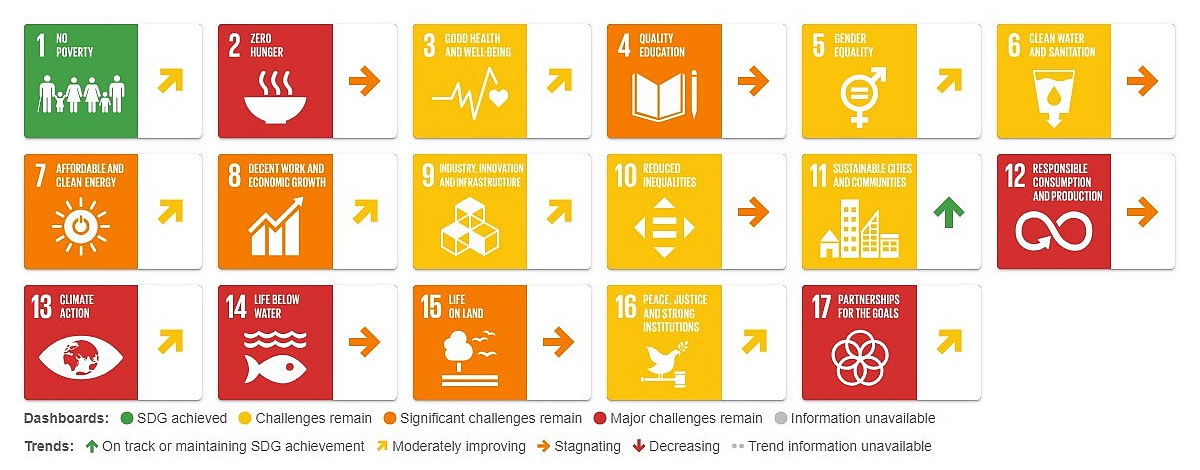SDGs Netherlands - Sustainable Development Goals
Sustainable Development Report 2024

The Sustainable Development Goals in the Netherlands
The Netherlands actively pursues the United Nations’ 17 Sustainable Development Goals (SDGs). These global targets aim to create a better world by 2030. The Dutch government coordinates national SDG efforts while working with various organizations.
Historical Background
In September 2015, all UN member states adopted the SDGs. The Netherlands immediately embraced this global agenda. In May 2016 the Dutch Cabinet presented its approach to implementing the UN Sustainable Development Goals (SDGs) in the Netherlands.
The Dutch approach focuses on both domestic implementation and international cooperation. Therefore, the country commits to achieving goals at home and abroad. This dual strategy reflects the Netherlands’ role as a developed nation with global responsibilities.

Key Organizations and Institutions
Ministry of Foreign Affairs
The Ministry of Foreign Affairs coordinates national SDG implementation. The Multilateral Institutions and Human Rights Department hosts a National SDG Coordinator and an SDG-team. This team works closely with other ministries to ensure comprehensive coverage.
Additionally, there are SDG Focal Points at all Dutch Ministries, but the coordination of SDG action lies with the Ministry of Foreign Affairs. This structure ensures government-wide commitment to sustainable development.
Statistics Netherlands (CBS)
CBS plays a crucial role in monitoring SDG progress. The organization produces regular reports on the Netherlands’ performance. Furthermore, CBS launches international SDG dashboard to track global progress.
CBS creates detailed analyses of all 17 SDGs. Their work includes dashboards with recent figures and EU rankings. This data helps policymakers make informed decisions.
PBL Netherlands Environmental Assessment Agency
PBL focuses on environmental aspects of sustainable development. The agency conducts research on climate action and circular economy challenges. Moreover, they analyze policies for inclusive green growth.
SDG Nederland
SDG Nederland brings together organizations and citizens working on sustainable development. Judith Maas, director of SDG Nederland, the foundation that brings together all organisations, citizens leads efforts to connect stakeholders across sectors.
Current Progress and Challenges
Areas of Success
The Netherlands shows strong performance in several SDGs. The country excels in work, education, health, and strong institutions. These achievements build on decades of social and economic development.
Access to quality education remains high across the country. Healthcare systems continue to deliver excellent outcomes. Additionally, democratic institutions maintain public trust and effectiveness.
Environmental Challenges
However, the Netherlands is unlikely to achieve the environmental SDGs by 2030. Climate action poses significant challenges for the densely populated nation.
The most challenging areas of action point to the circular economy (SDG 12), climate action (SDG 13), low-carbon energy transition (SDG 7), sustainable food and agriculture (SDGs 2, 15), and sustainable fisheries (SDG 14) according to environmental assessments.
Overall Assessment
At the current rate of progress, the Netherlands will not achieve all the SDGs by 2030. Nevertheless, the country has built solid foundations for many goals.
Recent reports show mixed results across different sectors. While awareness of the United Nations’ Sustainable Development Goals (SDGs) remains high among Dutch organizations, significant challenges persist in their prioritization, implementation and measurement.
Monitoring and Reporting
National Reports
The Dutch government will produce a national SDG report periodically between now and 2030 on the progress made towards the goals. These reports go to Parliament on national Accountability Day each May.
The first national SDG report was published in 2017. Since then, regular monitoring tracks progress across all 17 goals. This systematic approach ensures transparency and accountability.
International Cooperation
The Netherlands supports global SDG implementation through development cooperation. Civil society organisations play an important role in BHOS policy and in achieving the SDGs. The country funds poverty reduction programs worldwide.
Dutch expertise in water management, agriculture, and renewable energy benefits developing nations. Therefore, international partnerships multiply the impact of Dutch SDG efforts.
Key Partnerships and Initiatives
Multi-Stakeholder Approach
The Dutch SDG strategy emphasizes partnerships between government, business, and civil society. This collaborative approach leverages diverse expertise and resources. Consequently, implementation becomes more effective and sustainable.
Local governments also play vital roles in SDG achievement. Cities like Amsterdam and Rotterdam lead innovative sustainability projects. These urban initiatives demonstrate practical solutions for global challenges.
Innovation and Technology
The Netherlands invests heavily in sustainable technologies. Research institutions develop solutions for renewable energy and circular economy. Moreover, Dutch companies export green innovations worldwide.
Startup ecosystems flourish around sustainability challenges. Young entrepreneurs create new business models for sustainable development. This innovation culture accelerates progress toward SDG targets.
Looking Forward
The Netherlands faces both opportunities and challenges in achieving the SDGs by 2030. Strong institutions and high awareness provide solid foundations. However, environmental goals require accelerated action and significant investment.
Future success depends on several key factors. First, political commitment must remain strong across election cycles. Second, business and civil society engagement needs to deepen. Third, international cooperation should expand to maximize global impact.
The next five years will be crucial for SDG achievement. The Netherlands must accelerate progress on climate action and circular economy. Simultaneously, the country should maintain excellence in social and economic goals.
Innovation and technology offer pathways to faster progress. Dutch expertise in sustainable solutions can benefit both domestic and global objectives. Therefore, continued investment in research and development remains essential.
Finally, measuring progress accurately will guide future efforts. Regular monitoring and transparent reporting help identify successful strategies. This evidence-based approach ensures resources focus on the most effective interventions.
The Netherlands’ SDG journey demonstrates both the possibilities and challenges of sustainable development. With continued commitment and accelerated action, the country can make significant contributions to a more sustainable world by 2030.
UNDP
Netherlands Human Development Index (HDI) | Human Development Report
Thirty years ago, UNDP created a new way to conceive and measure progress. Instead of using growth in GDP as the sole measure of development, we ranked the world’s countries by their human development: by whether people in each country have the freedom and opportunity to live the lives they value.
› hdr.undp.org/data-center/specific-country-data#/countries/NLD

